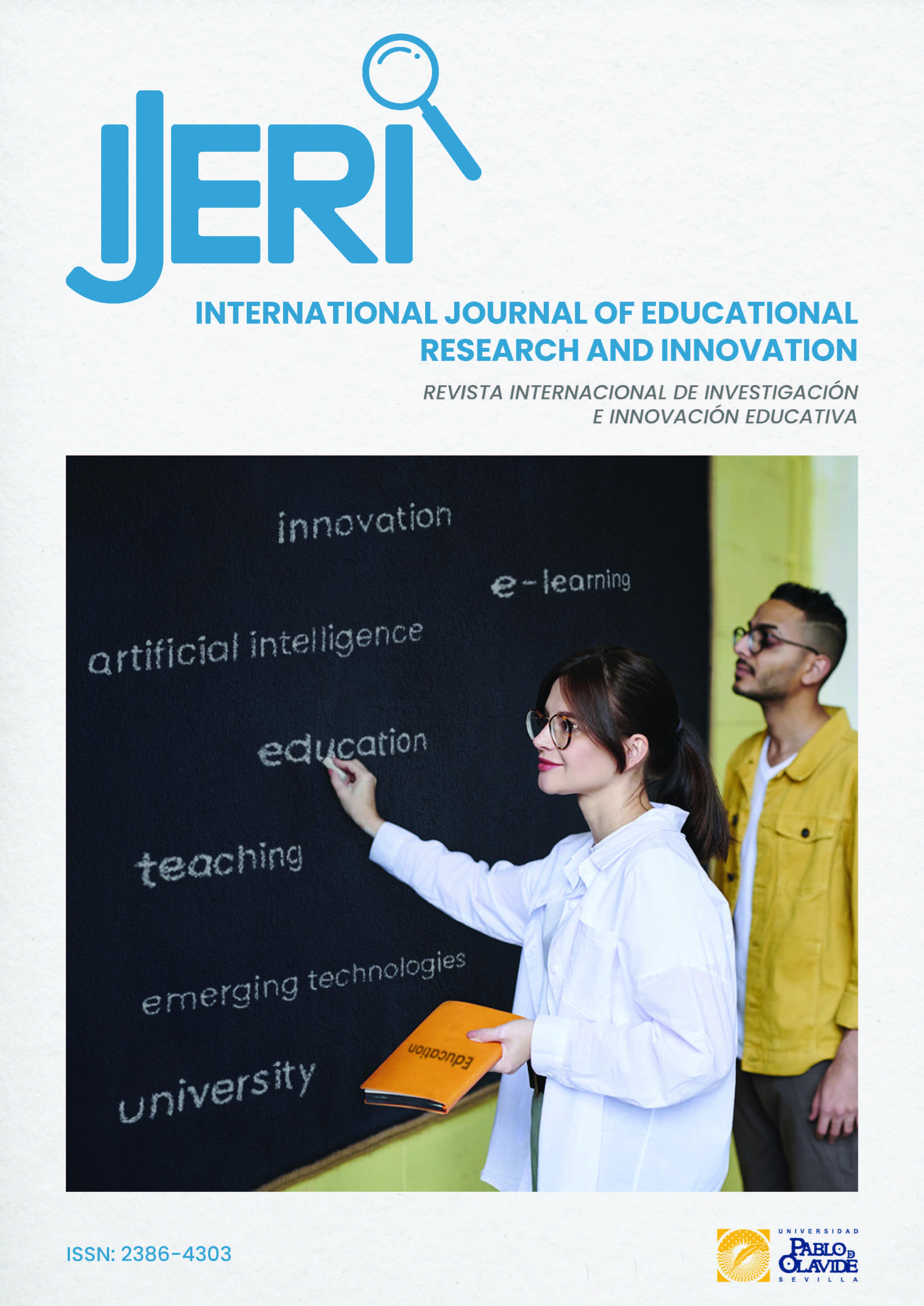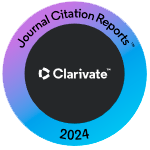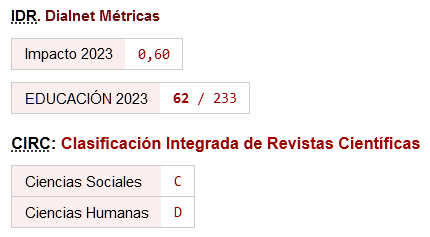Bibliometric visualization analysis of teachers' work stress
DOI:
https://doi.org/10.46661/ijeri.10257Keywords:
Teachers, work stress, bibliometrics, VOSviewer, Scimago GraphicaAbstract
Teacher work stress has been a matter of great concern for scholars. To better comprehend the current state of research on teacher work stress, it is essential to present an overview of the literature on this topic. Through bibliometric analysis, 212 pieces of literature on teacher work stress retrieved from the Scopus database were scientifically analysed. Statistical analyses of the selected literature indicate that research on teacher work stress has exhibited a gradually increasing trend in recent years. The previous research focuses on job satisfaction, teacher self-efficacy, and job burnout. In addition, job burnout, turnover intention, resilience, university teachers, gender, and job performance are the current cutting-edge themes. Bibliometric analyses of the literature on teacher work stress can provide insight into the current state of related research and reveal hotspots and trends. This study could serve as a valuable reference for future researchers, helping them to gain a better understanding of the field's development direction and to devise effective strategies for managing work stress.Examining bibliometric data on teacher work stress can offer valuable insights into the present status of relevant research and identify key areas of focus and emerging patterns. This study could be a helpful resource for future researchers, both in their comprehension of the field's development trajectory and in the creation of effective ways for handling work stress.
Downloads
References
Ahmi, A., & Mohamad, R. (2019). Bibliometric analysis of global scientific literature on web accessibility. International Journal of Recent Technology and Engineering, 7(6), 250–258.
Ahmi, A., & Mohd Nasir, M. H. (2019). Examining the trend of the research on extensible business reporting language (XBRL): A bibliometric review. Social Science Research Network, 5(2), 1145–1167. https://ssrn.com/abstract=3839843
Al-Fudail, M., & Mellar, H. (2008). Investigating teacher stress when using technology. Computers & Education, 51(3), 1103–1110. https://doi.org/10.1016/j.compedu.2007.11.004
Borg, M. G., & Riding, R. J. (1991). Occupational stress and satisfaction in teaching. British Educational Research Journal, 17(3), 263–281. https://doi.org/10.1080/0141192910170306
Brodsky, C. M. (1977). Long-term work stress in teachers and prison guards. Journal of Occupational and Environmental Medicine, 19(2), 133–138. https://doi.org/10.1097/00043764-197702000-00007
Burke, R. J., Greenglass, E. R., & Schwarzer, R. (1996). Predicting teacher burnout over time: Effects of work stress, social support, and self-doubts on burnout and its consequences. Anxiety, Stress & Coping, 9(3), 261–275. https://doi.org/10.1080/10615809608249406
Burnham, J. F. (2006). Scopus database: A review. Biomedical Digital Libraries, 3(1), 1–8. https://doi.org/10.1186/1742-5581-3-1
Chand, P., & Jaswal, V. (2018). Development of survey instrument for software professionals’ job stress: A factor and confirmatory factor analysis approach. International Journal of Business Innovation and Research, 17(3), 394–416. https://doi.org/10.1504/ijbir.2018.10016528
Chen, H., & Ho, Y.-S. (2015). Highly cited articles in biomass research: A bibliometric analysis. Renewable and Sustainable Energy Reviews, 49, 12–20. https://doi.org/10.1016/j.rser.2015.04.060
Chiu, W.-T., & Ho, Y.-S. (2007). Bibliometric analysis of tsunami research. Scientometrics, 73(1), 3–17. https://doi.org/10.1007/s11192-005-1523-1
Chuang, K. Y., Huang, Y., & Ho, Y.-S. (2007). A bibliometric and citation analysis of stroke-related research in Taiwan. Scientometrics, 72(2), 201–212. https://doi.org/10.1007/s11192-007-1721-0
Comerio, N., & Strozzi, F. (2019). Tourism and its economic impact: A literature review using bibliometric tools. Tourism Economics, 25(1), 109–131. Sagepub. https://doi.org/10.1177/1354816618793762
De Nobile, J., & McCormick, J. (2007). Job satisfaction and occupational stress in catholic primary schools: Implications for school leadership. Leading and managing, 13(1), 31–48.
Dong, B., Xu, G., Luo, X., Cai, Y., & Gao, W. (2012). A bibliometric analysis of solar power research from 1991 to 2010. Scientometrics, 93(3), 1101–1117. https://doi.org/10.1007/s11192-012-0730-9
Donthu, N., Kumar, S., Mukherjee, D., Pandey, N., & Lim, W. M. (2021). How to conduct a bibliometric analysis: An overview and guidelines. Journal of Business Research, 133, 285–296. https://doi.org/10.1016/j.jbusres.2021.04.070
Falagas, M. E., Pitsouni, E. I., Malietzis, G. A., & Pappas, G. (2008). Comparison of Pubmed, Scopus, web of science, and google scholar: Strengths and weaknesses. The FASEB Journal, 22(2), 338–342. https://doi.org/10.1096/fj.07-9492LSF
Fan, X. (2022). Study on stress management of college teachers based on employee assistance program. Journal of Education, 203(4), 812–817. https://doi.org/10.1177/0022057421996255
Fernández Aguayo, S., Magaña Rodríguez, O., Mondolfi Miguel, M. L. M., & Pino-Juste, M. (2017). Effective mindfulness-based stress reduction in teachers: A bibliometric analysis. The International Journal of Pedagogy and Curriculum, 24(1), 49–62. https://doi.org/10.18848/2327-7963/cgp/v24i01/49-62
Gallup. (2022). State of the global workplace report. In Gallup.com. https://www.gallup.com/workplace/349484/state-of-the-global-workplace-2022-report.aspx
Ganster, D. C., & Schaubroeck, J. (1991). Work stress and employee health. Journal of Management, 17(2), 235–271. https://doi.org/10.1177/014920639101700202
Garfield, E. (2001). From bibliographic coupling to co-citation analysis via algorithmic historio-bibliography [Drexel University]. A Citationist’s Tribute to Belver C. Griffith.
Geving, A. M. (2007). Identifying the types of student and teacher behaviours associated with teacher stress. Teaching and Teacher Education, 23(5), 624–640. https://doi.org/10.1016/j.tate.2007.02.006
Goodell, J. W., Kumar, S., Lim, W. M., & Pattnaik, D. (2021). Artificial intelligence and machine learning in finance: Identifying foundations, themes, and research clusters from bibliometric analysis. Journal of Behavioral and Experimental Finance, 32(1), 100577. https://doi.org/10.1016/j.jbef.2021.100577
Hakanen, J. J., Bakker, A. B., & Schaufeli, W. B. (2006). Burnout and work engagement among teachers. Journal of School Psychology, 43(6), 495–513. https://doi.org/10.1016/j.jsp.2005.11.001
Herman, K. C., Reinke, W. M., & Eddy, C. L. (2020). Advances in understanding and intervening in teacher stress and coping: The coping-competence-context theory. Journal of School Psychology, 78, 69–74. https://doi.org/10.1016/j.jsp.2020.01.001
Jentsch, A., Hoferichter, F., Blömeke, S., König, J., & Kaiser, G. (2022). Investigating teachers’ job satisfaction, stress and working environment: The roles of self‐efficacy and school leadership. Psychology in the Schools, 60(3), 679–690. https://doi.org/10.1002/pits.22788
Kessler, M. M. (1963). Bibliographic coupling between scientific papers. American Documentation, 14(1), 10–25. https://doi.org/10.1002/asi.5090140103
Klassen, R. M., & Chiu, M. M. (2010). Effects on teachers’ self-efficacy and job satisfaction: Teacher gender, years of experience, and job stress. Journal of Educational Psychology, 102(3), 741–756. https://doi.org/10.1037/a0019237
Klassen, R. M., & Chiu, M. M. (2011). The Occupational Commitment and Intention to Quit of Practicing and pre-service teachers: Influence of self-efficacy, Job stress, and Teaching Context. Contemporary Educational Psychology, 36(2), 114–129. https://doi.org/10.1016/j.cedpsych.2011.01.002
Klassen, R. M., Perry, N. E., & Frenzel, A. C. (2012). Teachers’ relatedness with students: An underemphasized component of teachers’ basic psychological needs. Journal of Educational Psychology, 104(1), 150–165. https://doi.org/10.1037/a0026253
Kyriacou, C. (2001). Teacher stress: Directions for future research. Educational Review, 53(1), 27–35. https://doi.org/10.1080/00131910120033628
Li, L., Ai, H., Gao, L., Zhou, H., Liu, X., Zhang, Z., Sun, T., & Fan, L. (2017). Moderating effects of coping on work stress and job performance for nurses in tertiary hospitals: A cross-sectional survey in China. BMC Health Services Research, 17(1). https://doi.org/10.1186/s12913-017-2348-3
Linden, D. V. D., Keijsers, G. P. J., Eling, P., & Schaijk, R. V. (2005). Work stress and attentional difficulties: An initial study on burnout and cognitive failures. Work & Stress, 19(1), 23–36. https://doi.org/10.1080/02678370500065275
Maslach, C., Schaufeli, W. B., & Leiter, M. P. (2001). Job burnout. Annual Review of Psychology, 52(1), 397–422. https://doi.org/10.1146/annurev.psych.52.1.397
McCarthy, Christopher J. (2009). The relation of elementary teachers’ experience, stress, and coping resources to burnout symptoms. The Elementary School Journal, 109(3), 282–300. https://doi.org/10.1086/592308
Nowrouzi, B., Nguyen, C., Casole, J., & Nowrouzi-Kia, B. (2017). Occupational stress: A comprehensive review of the top 50 annual and lifetime cited articles. Workplace Health & Safety, 65(5), 197–209. https://doi.org/10.1177/2165079916666300
Nwagwu, W. (2007). A comparative study of the productivity of HIV/AIDS literature on Nigeria and south africa in medline and science citation index. African Journal of Library, Archives and Information Science, 17(1), 1–13.
OECD. (2020). TALIS 2018 results (volume II). In TALIS. OECD. https://doi.org/10.1787/19cf08df-en
Park, J. Y., & Jeong, D. Y. (2013). A study on the intellectual structure of library and information science in Korea by author bibliographic coupling analysis. Journal of the Korean Society for Information Management, 30(4), 31–59. https://doi.org/10.3743/kosim.2013.30.4.031
Rahman, Md. S. (2018). Teachers’ peer support: Difference between perception and practice. Teacher Development, 23(1), 121–138. https://doi.org/10.1080/13664530.2018.1488765
Ramberg, J., Låftman, S. B., Nilbrink, J., Olsson, G., & Toivanen, S. (2021). Job strain and sense of coherence: Associations with stress-related outcomes among teachers. Scandinavian Journal of Public Health, 50(5), 140349482110118. https://doi.org/10.1177/14034948211011812
Romero, D. H., Riggs, S. A., Raiche, E., McGuffin, J., & Captari, L. E. (2020). Attachment, coping, and psychological symptoms among military veterans and active-duty personnel. Anxiety, Stress, & Coping, 33(3), 1–16. https://doi.org/10.1080/10615806.2020.1723008
Schwarzer, R., & Hallum, S. (2008). Perceived teacher self-efficacy as a predictor of job stress and burnout: Mediation analyses. Applied Psychology, 57(1), 152–171. https://doi.org/10.1111/j.1464-0597.2008.00359.x
Shann, M. H. (1998). Professional commitment and satisfaction among teachers in urban middle schools. The Journal of Educational Research, 92(2), 67–73. https://doi.org/10.1080/00220679809597578
Skaalvik, E. M., & Skaalvik, S. (2018). Job satisfaction, stress and coping strategies in the teaching profession—what do teachers say? International Education Studies, 8(3). https://doi.org/10.5539/ies.v8n3p181
Small, H. (1973). Co-citation in the scientific literature: A new measure of the relationship between two documents. Journal of the American Society for Information Science, 24(4), 265–269. https://doi.org/10.1002/asi.4630240406
Thomas, N., Clarke, V., & Lavery, J. (2003). Self-Reported work and family stress of female primary teachers. Australian Journal of Education, 47(1), 73–87. https://doi.org/10.1177/000494410304700106
Yeasmin, N., Ara, A., Khan, S. N., & Hossain, Md. M. (2015). Workers occupational stress problem in selected industry. International Journal of Indian Culture and Business Management, 10(3), 318. https://doi.org/10.1504/ijicbm.2015.068495
Yi, H., & Xi, Z. (2008). Trends of DDT research during the period of 1991 to 2005. Scientometrics, 75(1), 111–122. https://doi.org/10.1007/s11192-007-1828-3
Zhao, D. zhi, & Strotmann, A. (2008). Evolution of research activities and intellectual influences in information science 1996-2005: Introducing author bibliographic-coupling analysis. Journal of the Association for Information Science and Technology, 59. https://doi.org/10.1002/asi.20910
Zupic, I., & Čater, T. (2015). Bibliometric methods in management and organization. Organizational Research Methods, 18(3), 429–472. https://doi.org/10.1177/1094428114562629
Downloads
Published
How to Cite
Issue
Section
License
Copyright (c) 2024 MENG ZHANG, Lilis Surienty, Dong Hu

This work is licensed under a Creative Commons Attribution-NonCommercial-NoDerivatives 4.0 International License.












